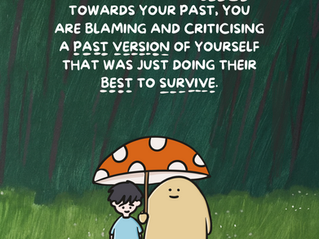WORKSHEET: Practicing Cognitive Defusion
- Hernping
- Feb 8, 2023
- 3 min read
Updated: Apr 2, 2023
Learning to distance yourself from your thoughts.

Our minds are always generating thoughts - that is its job after all - but most of the time we are are not even aware of it.
I'm sure you've caught yourself many times getting "lost in thoughts" before. You might even have a sudden realization that you've been deeply immersed in your thoughts and haven't been aware of what's around you.
This might be relatively harmless if it just means that you were really busy reading, working, or doing something you like to do.
However, this can also be harmful - especially when thoughts we are immersed in are not too friendly ones, take for example thoughts like:
"I'm not going to be able to finish this by today. I'm doomed".
"Everybody's going to think I'm stupid when I'm presenting later. I'm going to be sick".
"I'm such a failure. Why can't I get anything right".
"Everything needs to be perfect at the next event, if not (insert some irrational fear)".
One of the above sound familiar?
Don't fret, I promise you are not alone in this.
We spend most of our time "fused" with our thoughts - it makes all our thoughts seem real.
The term fusion means to be joined, become one, or to form a single entity; and we use the term cognitive fusion to mean the process of being joined to our thoughts.
When we are fused to our thoughts, especially thoughts like the above examples, bad things can happen.
As you can imagine, we might start to feel anxious, panic, upset at ourselves. All sorts of emotions can pop up.
We might also engage in actions and behaviours that aren't helpful too. As an example, take the thought of:
"Everything needs to be perfect at the next event".
What might that lead to? Well I'm guessing that we might be spurred into a blind mode of rushing, overworking, and even over-thinking.
Thankfully, there's an oppositive process to this of course, and you guessed it, it's call Cognitive Defusion.
The idea of Cogntiive Defusion is to learn to "catch" as well as distance ourselves from our thoughts - not seeing ALL of them as real.
It is one of the key components of Acceptance and Commitment Therapy.
And here's a very VERY important part of this practice.
Practicing Cognitive Defusion doesn't mean that such thoughts will suddenly go away!
I repeat, practicing cognitive defusion doesn't mean that your thoughts will suddenly disappear.
We are talking about your mind here - a mind that has been programmed to think in a certain way ever since you were born!
Thoughts cannot magically disappear.
The practice of Cognitive Defusion is really about this instead - to catch ourselves when we go down the track of unhelpful thought processes - and to then break the chain of unhelpful behaviours and actions that we would normally engage in.
This means that we can still choose meaningful and helpful behaviours despite having such thoughts. Because we defused from them.
(P. S. This is just one step in ACT. There are other practices to deal with thoughts and resulting emotions too).
And here's an additional plus. Over time, as we change our behaviours and actions, they work to reinforce how our thoughts function too - breaking the cycle between thinking, feeling and our resulting action :)
So check out the worksheet below.
Note the two parts of the worksheet:
A list of common cognitive defusion strategies - please try each one and practice the one that suits you best!
A log or diary for you to record down your practice.
Ready, let's go!
.jpg)
























